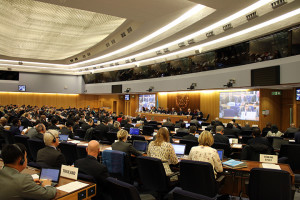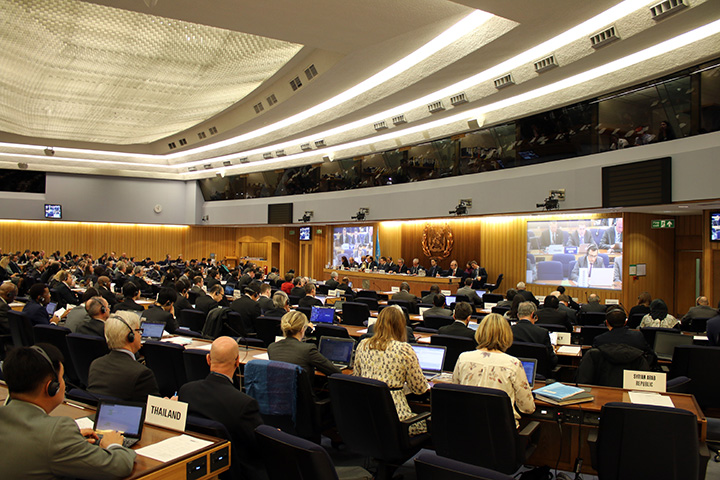
The International Maritime Organization (IMO) Facilitation Committee (FC) is expected to adopt mandatory requirements for the electronic exchange of information on cargo, crew and passengers as part of a revised and modernized Annex to the 1965 Convention on Facilitation of International Maritime Traffic (FAL).
In a statement, IMO said the adoption will be during the 40th session of FC on April 4-8 in London.
IMO said important proposed changes in the revised Annex include the introduction of a new standard relating to the obligation of public authorities to establish systems for the electronic exchange of information, within a period of three years after the adoption of the amendments.
FC will also receive an update on the IMO maritime single window project and will consider developing voluntary maritime cyber-security guidelines, including best practices, in order to protect the maritime transport network from cyber threats.
Other matters on the agenda are the revised guidelines on the use of electronic certificates and proposed amendments to the procedures for port State control, to include references to electronic certificates.
In his opening statement at the 40th FAL session, IMO Secretary-General Kitack Lim said “the comprehensive revision of the (FAL) convention with a view to ensuring that it adequately addresses the present and emerging needs of the shipping industry as well as the modernization of its provisions will thereby be completed.
“I am confident that the new amendments will be a significant step forward highlighting the importance of facilitation, and I strongly encourage efficient implementation of the new instrument.”
As for the maritime single window, Lim said that though “this is an ambitious, long-term project” for IMO, he encouraged FC to thoroughly discuss the issue, to “give clear guidance to the Secretariat on the way forward.”
“As you may be aware, this project may have a positive impact on compliance with the new requirements expected to be adopted by FAL 40,” he added.
Chile, Norway, South Korea, and the European Commission have provided their expertise and funding for the project, and Lim encourages other member states and international organizations “to take inspiration from this positive example and offer similar assistance.”
The IMO Secretary-General, meanwhile, emphasized the importance of facilitation in international maritime transport. “Facilitation is essential to achieve efficiency within shipping and thereby reap the benefits of its positive impact on the world economy,” Lim said.
He noted that Article 1 of the IMO Convention states that one of the purposes of the maritime organization is to encourage and facilitate the general adoption of the highest practicable standards in matters concerning the efficiency of navigation. A similar principle is recognized in article 1 of the FAL Convention, referring to the adoption of all appropriate measures to facilitate and expedite international maritime traffic and to prevent unnecessary delays to ships and persons and property on board.
Since IMO was established in 1959, the volume of world trade has increased by over 300 times, Lim pointed out.
“The world population has topped 7 billion and continues to rise. Maritime activity already provides an important source of invisible income to many developing countries,” Lim added.
“The truth is, shipping affects us all. No matter where you may be in the world, if you look around you, you are almost certain to see something that either has been or will be transported by sea, whether in the form of raw materials, components or the finished product,” he further stated.
Thus, Lim said this is why the theme chosen for World Maritime Day 2016 is “Shipping: indispensable to the world.” Lim quoted United Nations Secretary-General Ban Ki-moon who said that “shipping is the only viable delivery mechanism that can support global trade and the global economy” but “in order for shipping to function you also need ports–and consider, more specifically, how ships and ports interface with each other; about how the vital cargoes that ships carry around the world are packaged and handled, loaded and offloaded and moved on to their next destination.”
Lim suggested to FC to “focus more on the relationship between ships and ports.”
“IMO has been working intensively, over many years, on technical matters of all kinds affecting shipping engaged in international trade. But how much emphasis have we placed on the port as a fundamental service provider to ships?” he stated.
His second suggestion is to make FC even more inclusive and to encourage active participation from all stakeholders within government and industry.
Thirdly, he urged the FC “to consider if the time is now right” to review the decision taken by FAL 37, nearly five years ago to meet every 18 months, and increase the frequency with which it meets.
This decision would allow the Committee to cooperate more efficiently with the other committees and therefore it would have a positive impact on the work of IMO, Lim said.
He noted recent cases such as the decision of FC on the use of electronic certificates, that has an impact on the work of IMO’s Maritime Safety Committee and Maritime Environmental Protection Committee, would achieve a broader and more effective outcome if FC would be able to interact more frequently with the other committees.
“I believe that this will better enable the Committee to develop and achieve momentum in its important work. In this context, I am pleased to note that this biennium, FAL is scheduled to meet twice,” Lim said. – Roumina Pablo





